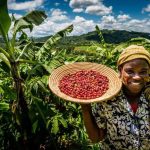
How to apply to join SOMA
#1. Front-End Process
SOMA is a web based application that be accessed from either computers, laptops and smart mobile devices over the internet and access is by typing the application address into your browser www.soma.adc.ug
To access the application lessons, a user must be registered with an account. Upon registration, a user can access and enroll for any selected course of choice and start learning. The learning process involves steps that a user undertakes and at the end a user receives a certificate.
#2. Backend Process
The application runs on a 3-tier architecture where we have clients (browsers, server (files storage and page rendering) and a data store. This infrastructure is cloud based.
APPLICATION FEATURES
The application has the following features:
1. Registration/Sign up
A user accesses SOMA and registers for an account by clicking “START COURSE” button then click on Register tab to show the “Register for an account”. Upon successful registration, user receives both an email & SMS text with his/her account details.
2. Module/Course Enrollment
Once logged in, a user can enroll for any module/course of choice by clicking “START COURSE” as the selected course is added to his/her account.
3. Course Overview
User has access to course sessions and details and can view a summary of each session under the course.
4. Course Lesson
Users can access lesson content i.e. video, text, graphic as they learn and get to make them complete if they are done understanding the lesson.
5. Forums
Interactive messaging for users within a course to enable discussions. There is also a chat box where you can ask a question to the ADC business advisors.

What you need to know about SOMA
SOMA supports a variety of content mainly in these categories: – video, graphics, audio, and text to render a unique learning experience to users.
Product Description
The ADC e-learning is a web based (internet based/ powered) self-learning platform that allows for users (unique compared with other eLearning platforms in simplicity), mainly individual farmers, farmer-based organization management and farmer members who belong to FBO to access learning resources (governance and leadership, financial literacy and management and marketing) virtually. The e-learning is designed on a self-based learning methodology where members can access the system, register for accounts, and choose any courses they may wish to learn and gain skills on.
Overall Goal
The main goal of the platform is to give a learning opportunity to FBOs and members the ADC cannot reach in the physical to self-learn by accessing the different resources available on the platform remotely.
Objectives
► Improve on the efficiency and effectiveness of how training services are delivered to the ADC set target (FBOs; producer cooperatives, marketing cooperatives, SACCOs engaged in SMEs)
► Foster self-paced learning at own convenience for both FBOs and individual farmers in ADC hard to reach areas at a minimal cost.
► Increase the ADC training capacity: currently trained 7,563, we want to reach over 100,000+ farmers remotely.
► Collect relevant data (feedback and FAQs) from the learners to be able to improve learner materials on the platform.
Misusing money
Nalugotti Cissy – Farmer
“The Simu+ has not only helped me as a person but also my business. I am right now encouraging other people to finish the training so that they know how to do bookkeeping and avoid misusing money”
Our portfolio has grown to Shs. 5 Billion
Janet Kyasimire – Kigarama People’s Cooperative Saving & Credit Society
“We have seen our growth through the training’s ADC has been giving us. We started working with Raba Foundation 5-year back with our first loan of 250 million which increased our net income and mobilized more members however most of the members we serve are illiterate about finance so we needed ADC to train the farmers we work with so that they are able to pay back their loans but most importantly for the farmers to be able to expand their businesses.
“We recently got another loan from Rabobank foundation as a SACCO of 1 billion which has lifted our portfolio to five billion and our members are now financial literate. Robert Mugabi is one of our members who has received agriculture loans over ten times from our SACCO and also getting training form ADC”
SOMA can change lives
Musinguzi Marion – Apple Farmer, Kanungu
“I got to know SOMA from my mother who sent me a link via Facebook. All the processes of registering and learning were seamless and I think it will change the lives of my village farmers since most of them are still illiterate.”
I now get Ugx 6million per month
Robert Mugabe – Kigarama People’s Cooperative Saving & Credit Society
“I first got Ugx. 10million then Ugx. 25million. I pay monthly on a 2.7 % interest in reducing balance. I keep my records and keenly follow my loan repayment and I also know how much I have put in my farm just like I was taught by ADC, so it is easier for me to repay the loan.
I have never defaulted my loan, I pay promptly. I recently applied for Ugx. 30million to develop a new plantation and a tree plantation so that the trees can help me to deal with hailstorm and the like. When the banana is at its peak, I get 6 million per month, for example this month I harvested thrice because it is the season.”

How relevant is eMata App?
By Anja De Feijter
How is the new mobile App for Dairy farmers relevant to farm technologies and management?
Farm management draws on agricultural economics for information on prices, markets, agricultural policy, and economic institutions such as leasing and credit. This means the dairy sector needs to include information support systems to Dairy management information system supports four of five propositions: reduced product shortcoming, optimal product mix, quality, and efficiencies for the farmers.
Agribusiness development Centre(ADC) together with our partners developed a solution for the dairy farmers and rolled to Bugerere dairy cooperative with over 300 members. Edward Mukimbiri, a farmer in Bugerere Dairy cooperative, delivers 20 liters per day for two times 6:00am and to his cooperative where he is a manager, when he delivers his milk.
eMata is an application tailored for dairy farmers to allow them to use the power of loans to invest in the productivity of their produce. It allows transparent recording and ensures daily milk deliveries are registered whereby the farmer automatically gets instant information about the quantity and price of the milk delivery.
eMata allows dairy cooperatives to effectively manage their administration, including their membership, farmer profiles, payment methods, deliveries and deductions. It makes calculation of farmer payments simple and fast, and supports multiple modes of payment such as cash, mobile money and bank.
When financially sustainable technologies and good management practices are used in unison, new levels of farm productivity become obtainable. The long-term goal of the app is to use the data to provide financial services to cooperatives and farmers, such as credits in terms of goods and services, loans and payments.
eMata is free to use but distributed through field partners and rolled out on cooperative basis. If you want to use eMata for your cooperative, please contact Laboremus Uganda Ltd. “Through smart use of both technology and field training, we believe that this partnership will build a foundation on which cooperatives and farmers can grow stronger, more efficient and prosperous.
The standards of living of rural farmers.
According to statistics from Uganda Dairy Development Authority, out of Uganda’s annual milk production of 2.5 billion litres, 80 per cent is sold while 20 per cent is consumed by the producing households. Middlemen take the lion’s share of proceeds from milk and this is so because farmers face challenges such as difficulty in accessing the market, production on a small scale by individual farmers and failure to access financial services to improve on production, among others.

Farming, A profession of hope
Interviewed by Basemera Priscilla.
Alexander Ruhweza, a franchise support associate at Jibu Water with a specialty in agribusiness shares with us his journey in the agricultural sector.
Before you ventured into Agriculture, what were you doing?
Agriculture has always been my side business which I ventured in during my university days. I used to do part time work on a farm while in Australia. On my return to Uganda, desire to practice agriculture that can help me has never withered.
What type of Agriculture do you carry out?
At the moment, I practice animal husbandry, specifically cows and goats. I am also doing maize, soybean and passion fruit on a large scale in Fort Portal.
As a large-scale farmer, do you operate the passion fruit plantation as an individual or as a cooperative?
Actually, the passion fruit growing done on large scale falls under a project called KadAfrica and we specifically work with girls only.
Tell us more about this project. Why girls in particular?
Great question, firstly the girl child is more vulnerable, marginalised and have a number of problems she faces. Because of that, we designed this project where we recruit 20 -30 girls, look for a nearby church with free land and put that land to use. Churches have a lot of land available, so we sign a contract with them to use about 2 acres of their land for a minimum of three (3) years. This land is divided into sub plots and we provide seedlings and chemical inputs. After the crop is grown, we buy the harvest from them. With this, the girls come out empowered with both farming and business skills. This has greatly improved the standard of living for most of them and their family members.
What is the criteria for the girls you choose to work with?
Our focus is on the girl within the age brackets of 13 -24 years because statistically this group is vulnerable to evils such as early pregnancy, defilement, early marriages and STDs. Contextually, we felt it right to assist this fragile group hence the choice of criteria.
When did you start this project?
The project has been in existence for 7 years. I can proudly say that it has grown exponentially to about 70 acres of passion. In addition, we are slowly moving into soybean growing known as the Alexander Macrea project which will have a forward integration so as to produce processed soya products.
How many girls are you working with at the moment on KadAfrica?
Around 2,000 girls.
Is this project specific to areas within Fort Portal only and are there plans on expanding?
We are currently present in Kabarole and Kyenjojo but growing slowly as we are limited by funds. If we are to expand, we will do so within surrounding areas like Kyegegwa, Kasese, Bundibugyo and Ntoroko.
Price Risk Management training benefited me
Matovu Richard – Bufumbo Organic Farmers Association
“We exported over 40 metric tons in the first year and then we exported 63 metric tons of coffee. With the Price Risk Management training and the financial literacy trainings has taught us how to negotiate a contract, what the different incoterms mean. Now that I know my stand in the market, I can well express myself with the buyer and ask for better prices. The training is also helping us on how to arrange our data, with the spread sheets we can extract data easily.”

Effects of COVID-19 on FBOs
By Communications Staff
Agribusiness Development Centre (ADC) supports farmers in 4 different regions of the country by training them in good governance, financial literacy, marketing and a special training for coffee and cocoa farmers in price risk management.
During the pandemic, ADC carried out a research through its experienced group of business advisors in the Eastern, Western, Central and Northern regions to find out how the pandemic had affected their businesses and lives so that solutions are found to the challenges.
Below are some of the challenges and some of the solutions ADC adopted:
- Drop in Prices for example milk ugx 800-500, Cocoa 7000-6500 which leads to increased side selling.
- High Prices of Agricultural Inputs like quality Seeds/Fertilizers or pesticides.
- Low liquidity levels for SACCOs due to low Savings, and credit due to lack of mobilization [Two most areas where SACCOs remain Liquid]
- There is a high default lending {90% of borrowers are into arrears]
- Low subscriber growth because of halt in operations which means there are no new members coming registering
- Lost contracts with Buyers [Millers] because the FBOs could not meet the required quantity.
- Exporters are holding on stock, no longer buying from local buyers. [Cocoa – Bundibugyo]
All the above challenges need a combined effort from ADC and its partners to support the FBOs to get back on their feet.
ADC has created an e learning tool to give farmers trainings virtually to continue building their capacity so that they can become self-sufficient. An SMS system was also adopted during the lockdown, daily messages that enlightened farmers on measures of how to keep safe from COVID19 and the daily tips on financial literacy especially during a crisis.
ADC also created a WhatsApp group where most farmers who have smart phones can interact and share experiences but most importantly it acts as a market connection for farmers who advertise on the platform but also referrals from the Business Advisors and processors on the group.
Finally, one of ADC’s effort is towards working with Partners to create packages and develop sustainable modules to support farmers.
Great appreciation goes to those that have supported ADC to be able to continue supporting Farmer Based Organizations (FBOs).




